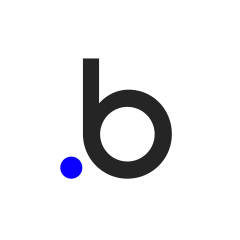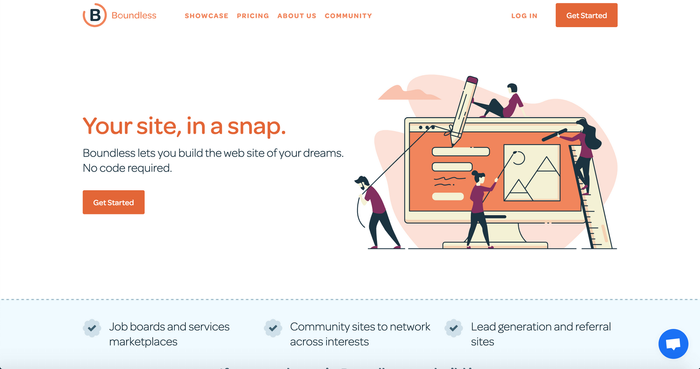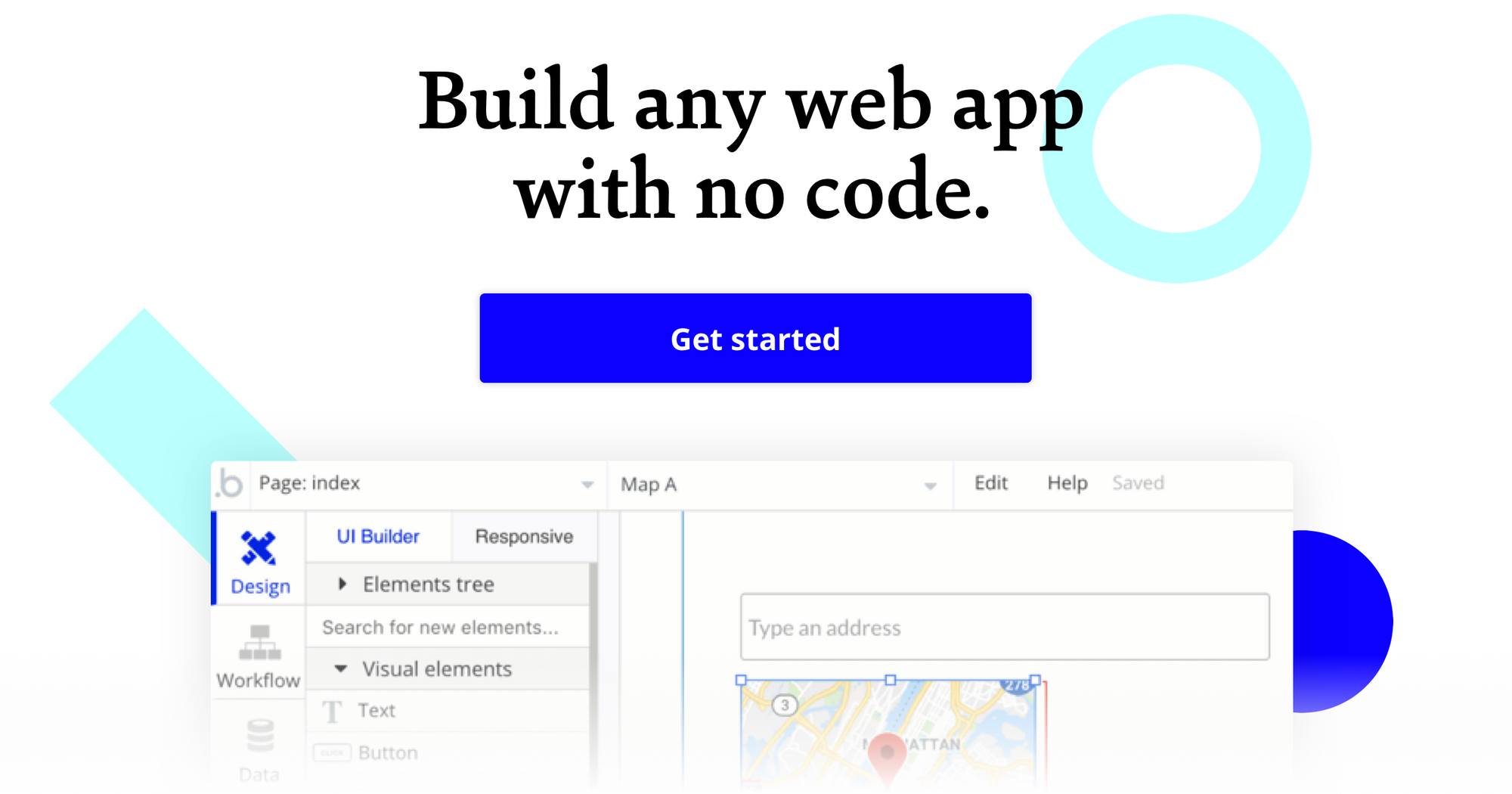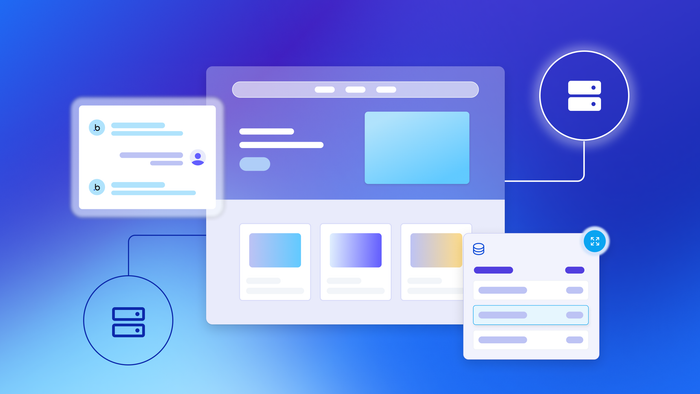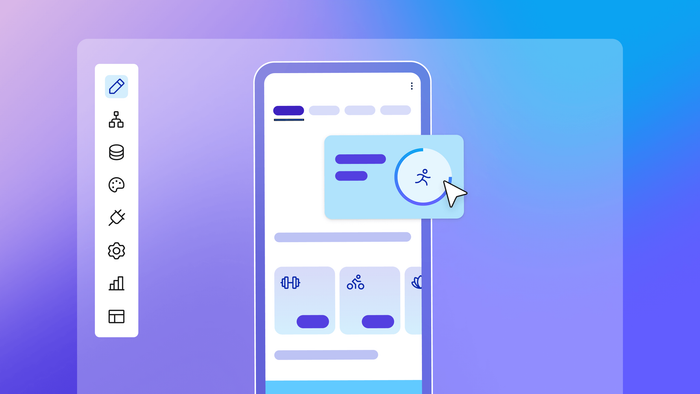At Bubble, we want to enable potential builders to create their ideas without code, so we are exploring and reviewing the many tools and software that entrepreneurs might use to build apps.
What is Boundless?
Boundless is a no-code website builder that is designed to create things like job boards, service marketplaces, community sites, social networks, and lead generation & referral sites.
The no-code platform’s drag-and-drop editor lets you build responsive, precise designs, as well as add dynamic elements, interactive features, and data-driven content.
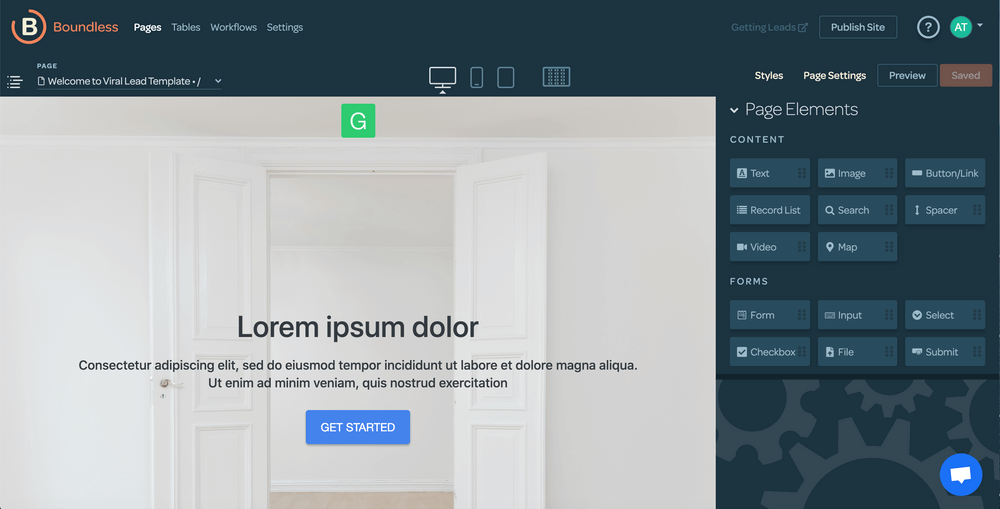
Collecting, processing, and presenting data is easy with Boundless; the platform’s database functions somewhat like a spreadsheet, with powerful yet simple data tables. You are able to build forms that integrate with data tables, as well as create forms from existing ones.
With Boundless, you can build workflows that automate a number of time-consuming tasks, such as sending customers an email when an order is ready. Unlike most traditional CMS platforms, Boundless allows you to incorporate complex logic such as loops and conditionals into your workflows.
Boundless also integrates with a number of commonly used third-party services, including but not limited to Stripe, Google Analytics, Google Tag Manager, Slack, and Mailgun.
Who is Boundless for?
Boundless users include freelancers, small and medium-sized businesses, startups, and larger enterprises.
People who want to build a website with striking front-end designs, as well as with back-ends that allow for some advanced logic, will find Boundless useful for framing their projects.
Boundless Cost and Pricing?
(Pricing model evaluation: July 2020)
Boundless offers free and paid versions of its services; all subscription options come with page editing tools, advanced workflows, and data management.
Explore: The Boundless Explore option is free and includes Boundless domain hosting and Boundless branding, as well as 10k unique visitors, 1k records, and 1k workflow runs per month. However, Boundless charges a 3% fee on Stripe payments.
Standard: At $19/month, the Boundless Standard option comes with all of the Explore features, plus custom domains, email & chat support, Google Analytics, and the ability to remove Boundless branding. You receive 100k unique visitors, 10k records, and 10k workflow runs per month; Boundless charges a 1.9% transaction fee on Stripe payments, down 1.1% from the free option.
Pro: The Boundless Pro option, which includes the same benefits offered by the Standard plan, costs $69/month and also comes with support for custom email server, priority support (within one business day), Google Tag Manager, in-app subscriptions, and no transaction fees on Stripe payments. Those who subscribe to this option receive 500k unique visitors, 50k records, and 50k workflow runs per month.
Premier: The most expensive option, the Boundless Premier plan costs $299/month and comes with all of the Pro features, as well as 2 hours of premium support per month, segment integration, and table/data recovery tools. This plan allows for 2 million unique visitors, 300k records, and 300k workflow runs per month.
Additional features that can be purchased à la carte for $10/month each include:
- 10k records
- 10k workflows
- 50k unique visitor blocks
Boundless vs. Bubble: A Comparison
How does Boundless compare to Bubble?
Similarities between Boundless and Bubble:
Both Boundless and Bubble are no-code web app development platforms.
Both provide drag-and-drop editors.
Both Boundless and Bubble currently have a free plan option.
Both offer paid options that make it possible to remove branding.
Both allow you to build workflows that use complex logic, such as loops and conditionals.
Both can be used by freelancers, startups, and small-and-medium sized businesses.
The key differences between Boundless and Bubble are:
Third-party integrations: Boundless allows for seamless integration with a limited number of third-party services, including Stripe, Google Analytics, Google Tag Manager, Slack, and Mailgun. Similar to WordPress, Bubble offers a robust ecosystem of 1000+ plugins, with new ones being added each month.
Database and workflows: Boundless has a database that resembles a spreadsheet, though the no-code tools also enable you to build complex workflows that incorporate advanced logic, such as loops and conditionals.
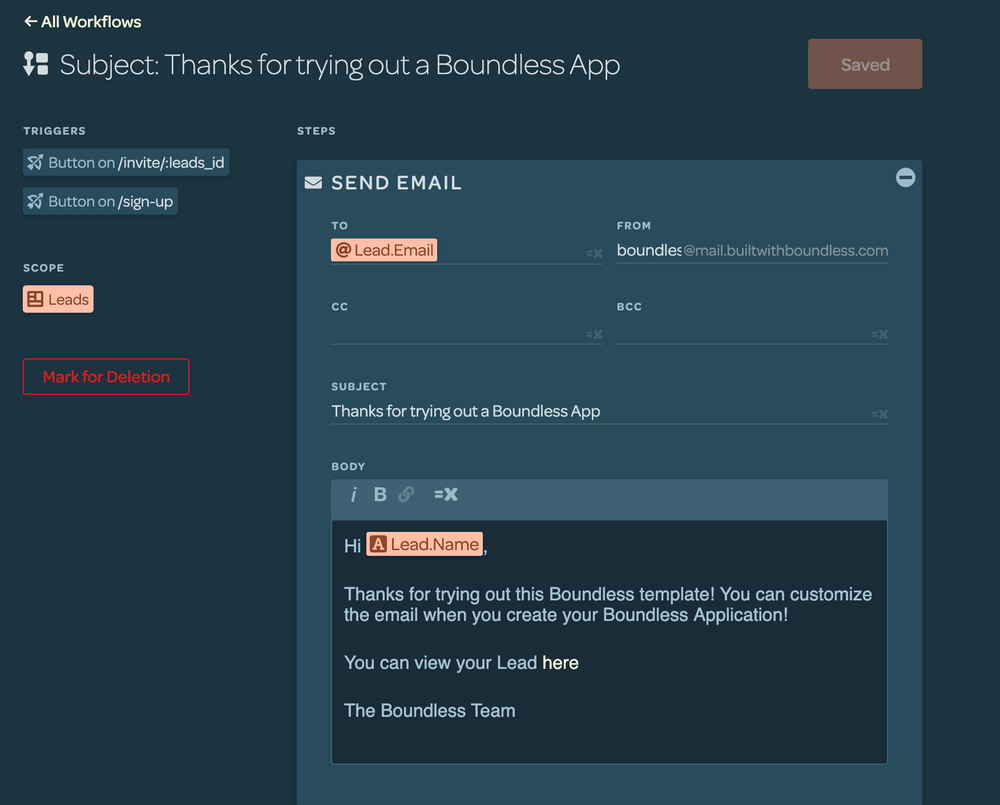
Unlike Bubble, Boundless does not provide full back-end database functionality built-in. Bubble, on the other hand, makes it possible to connect to any API or backend. Building features such as a comments system or an upvoting system is easier in Bubble, but more difficult in Boundless.
Dynamic vs Static: With Bubble, you can build web applications that resemble Airbnb, Twitter, Facebook, and Spotify. A Boundless website is also a full-featured web app, not just a collection of pages. But, like WordPress, Boundless limits your ability to build robust, dynamic websites, so the no-code website builder is a good option for static use-cases, such as a portfolio.
Alternatives to Boundless
Alternative no-code website builders or tools that allow you to build a web application without code include the following tools:
If you’re looking for a platform that has support for native or mobile apps, consider using no-code tools like Adalo, Glide, or Thunkable.
If you need a platform that helps you to automate internal workflows, no-code tools like Clay, Zapier, and Parabola might meet your needs.
If your project requires basic landing pages and simple CMS, and you don’t need to use advanced logic like conditionals or loops, then templated website hosts like Carrd, Squarespace, Wix, or Weebly are good alternatives.
If you need full freedom over front and back-end elements, and you want to build a web application that requires advanced database functionality (such as a fully integrated marketplace), no-code platforms like Bubble are a good alternative to Boundless.
If you want an open-source CMS platform that allows you to extend your website’s functionality by integrating it with plugins, take a look at WordPress.
About Bubble
Bubble is a leader in the no-code movement. Bubble offers a powerful point-and-click web editor and cloud hosting platform that allows users to build fully customizable web applications and workflows, ranging from simple prototypes to complex marketplaces, SaaS products, and more. Over 400,000 users are currently building and launching businesses on Bubble - some have gone on to participate in top accelerator programs, such as Y Combinator, and even raised $365M in venture funding. Bubble is more than just a product. We are a strong community of builders and entrepreneurs that are united by the belief that everyone should be able to create technology.
Join the no-code movement today.
Disclaimer: The goal of these reviews is to provide an honest, practical, differentiated comparison of features and educate readers on tools in the no-code ecosystem so that you can evaluate how these services fit together and serve your needs.
Build your app on Bubble's Free plan. No need to upgrade until you're ready to launch your app.
Join building